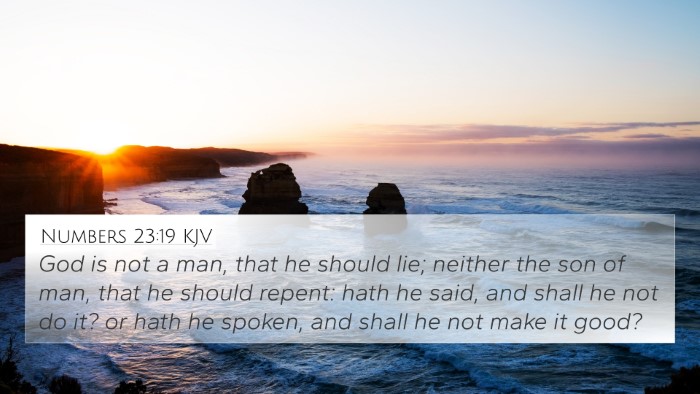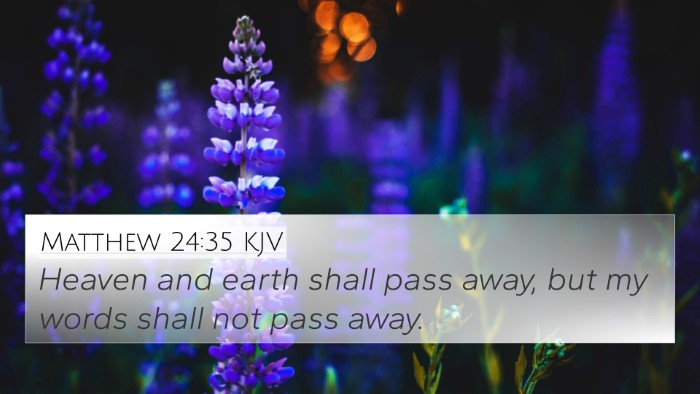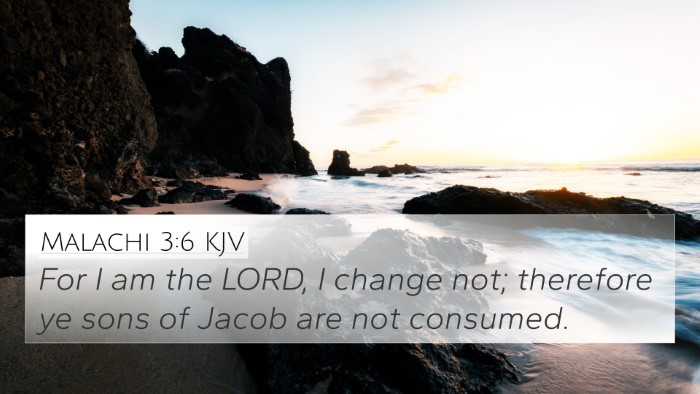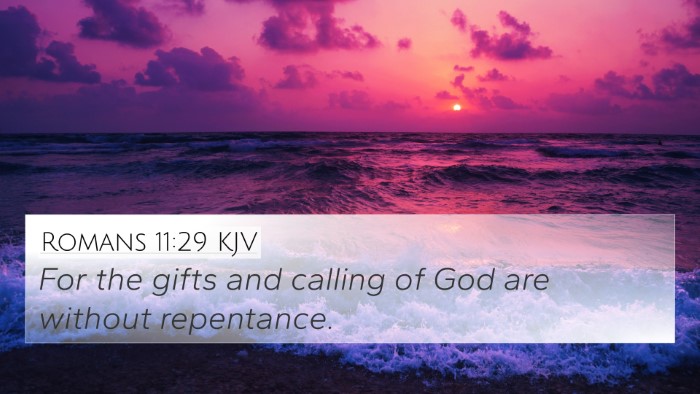Psalms 89:34 - A Comprehensive Interpretation
Bible Verse: "My covenant will I not break, nor alter the thing that is gone out of my lips." (Psalms 89:34)
This verse encapsulates God's unwavering fidelity to His promises, emphasizing the unchangeable nature of His covenant. The verse stresses the reliability of God's word, assuring believers of His continual faithfulness.
Exegetical Insights
This verse serves as a powerful reminder that God's commitments are not subject to change or retraction. Various public domain commentaries provide valuable interpretations:
- Matthew Henry: He notes that God’s covenant is established in His sovereignty. No external influence can sway God’s fidelity. The essence of this verse lies in the assurance that God will not break His promises, reaffirming His ultimate authority in the relationship He has established with humanity.
- Albert Barnes: Barnes focuses on the immutability of God's word, stating that God does not change His mind about commitments made. He draws parallels with other scriptures that affirm God’s fidelity and capacity to fulfill His promises, providing a strong basis for believers to find hope and trust in God’s declarations.
- Adam Clarke: Clarke elaborates on the nature of the covenant, interpreting it as both a legal binding and a relational promise. He emphasizes that the covenant encompasses God’s intentions for His people, highlighting a theme of grace and loyalty inherent in divine-human relationships.
Key Themes and Connections
The themes in Psalms 89:34 connect richly with other verses throughout Scripture, establishing a cohesive biblical narrative of divine faithfulness and the significance of God’s promises. Here are several key connections:
- Numbers 23:19: "God is not a man, that he should lie; neither the son of man, that he should repent: hath he said, and shall he not do it? or hath he spoken, and shall he not make it good?" - This verse reaffirms God's unchangeable nature in contrast with human fallibility.
- Isaiah 55:11: "So shall my word be that goeth forth out of my mouth: it shall not return unto me void, but it shall accomplish that which I please, and it shall prosper in the thing whereto I sent it." - This emphasizes the efficacy of God's word, connecting deeply with Psalms 89:34.
- Hebrews 6:18: "That by two immutable things, in which it was impossible for God to lie, we might have a strong consolation, who have fled for refuge to lay hold upon the hope set before us." - The writer stresses God's trustworthy nature, linking back to His promises.
- Romans 11:29: "For the gifts and calling of God are without repentance." - This indicates that God does not withdraw His promises, similar to what is presented in Psalms 89:34.
- 2 Peter 3:9: "The Lord is not slack concerning his promise, as some men count slackness; but is longsuffering to us-ward, not willing that any should perish, but that all should come to repentance." - Here, the verse elaborates on God's patience and fidelity toward fulfilling His covenant.
- 1 Corinthians 1:9: "God is faithful, by whom ye were called unto the fellowship of his Son Jesus Christ our Lord." - Paul's declaration of God’s faithfulness suggests a foundational characteristic that echoes the assurance in Psalms 89:34.
- Psalm 119:89: "For ever, O LORD, thy word is settled in heaven." - This encapsulates the eternal nature of God's decrees, linking back to the assurance provided in Psalms 89:34.
Applications and Reflections
This verse encourages believers to rely on God's faithfulness in their lives. It underscores the importance of understanding biblical covenants through the lens of God's consistent character. Reflecting on this verse can guide personal faith journeys and bolster assurance during uncertain times.
- Trust in God's Promises: Believers can find comfort knowing that God's promises endure through all circumstances.
- Encouragement during Trials: When facing difficulties, remembering Psalms 89:34 can provide a source of hope and strength.
- Motivation for Prayer: Understanding God’s faithfulness can enhance one's commitment to prayer, seeking to align with His plans.
- Strengthening Faith Communities: The church can gather around the assurance of God’s promises, fostering support and encouragement among members.
Cross-Referencing Tools
To further explore the implications of Psalms 89:34, utilizing tools for Bible cross-referencing can deepen understanding. Here are some recommended methods:
- Using a Bible concordance to locate related verses lays groundwork for deeper study.
- A cross-reference guide may help identify themes consistently addressed throughout scripture.
- Engaging in cross-reference Bible study can facilitate discussion on connecting passages, enhancing shared insights.
- Employing a Bible chain reference method allows exploration of thematic links between verses across different sections of the Bible.
Conclusion
Psalms 89:34 stands as a testament to God's unwavering covenant and His reliability. The insights from various commentaries and the interconnections with other scriptures provide a deeper understanding of both God's nature and the engagement of His people with His promises. These themes of faithfulness and assurance resonate throughout the biblical narrative, inviting believers into a deeper relationship with the Divine.










